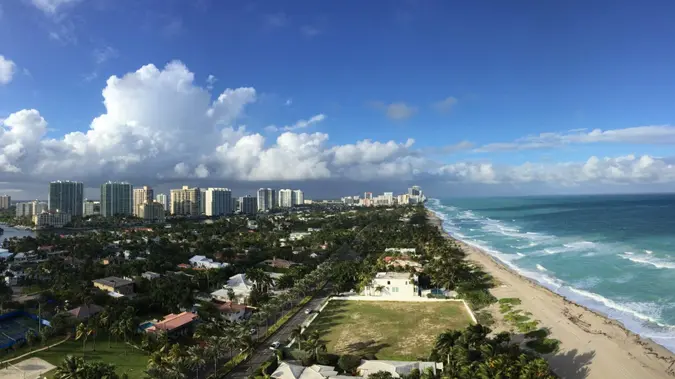5 Key Signs You Need To Downsize Your House

Commitment to Our Readers
GOBankingRates' editorial team is committed to bringing you unbiased reviews and information. We use data-driven methodologies to evaluate financial products and services - our reviews and ratings are not influenced by advertisers. You can read more about our editorial guidelines and our products and services review methodology.

20 Years
Helping You Live Richer

Reviewed
by Experts

Trusted by
Millions of Readers
Downsizing to a smaller home is usually associated with empty nesters who are nearing retirement age, but that’s not the only reason you might want to do it. A variety of factors can come into play, from shifting finances to a new lifestyle.
Here are five key signs you might need to downsize your house.
Your Costs Have Increased
When the cost of your home begins to take too big a chunk out of your monthly budget, it’s a clear sign you should downsize. This might happen if you get hit with higher property taxes, HOA fees or insurance premiums, or have an adjustable rate mortgage loan that suddenly got more expensive.
Most financial experts recommend keeping your housing costs at 30% or less of your income. When you see that number move higher, consider downsizing.
“If housing costs exceed 30% of your income, downsizing can help restore financial balance,” said Alexei Morgado, a Florida-based Realtor and CEO/founder of Lexawise Real Estate Exam Preparation.
Your Income Has Decreased
Even if your housing costs remain the same, you might still find yourself in a financial bind if your income goes down due to a job loss, cut in pay or bad investment. Again, if the lower income means your housing costs go above the 30% threshold, it’s a sign that you should downsize.
Home Maintenance Has Become Too Difficult
Big houses and yards are great when you need the extra room, but they’re not so great if the maintenance and upkeep become too physically demanding and/or expensive.
Older homeowners often downsize so they can reduce the amount of effort it takes to maintain a home. But even if you are relatively young, you might have a hard time maintaining your home if you developed a medical condition that limits you physically.
“When maintaining your home becomes physically exhausting or financially burdensome, moving to a smaller, more manageable space can alleviate stress and reduce expenses,” Morgado said.
Your Home No Longer Fits Your Needs or Lifestyle
Here’s another common reason retirees want to downsize their house — they want to free up more time and money to pursue new passions.
“Lifestyle changes, such as retirement or a desire for increased mobility and travel, often make a smaller home a better, more practical choice,” Morgado said. “Additionally, high maintenance costs, significant home equity that could be utilized elsewhere and evolving personal needs are factors that might prompt considering a move to a more suitable residence.”
You Have Too Many Empty Rooms
A home can suddenly seem a lot bigger when family members move out, leaving you with bedrooms that are no longer needed. Unless you have plans to rent the extra space out, or use it for some other purpose, then having too many empty rooms is a sign that you should downsize.
“Unused rooms … may indicate you’re paying for more space than necessary,” Morgado said.
 Written by
Written by  Edited by
Edited by 

























